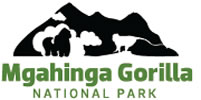Mountain Gorillas are magical creatures which amuse every tourist no matter how hard one can be and most tourists only look at meeting up the gorilla permit price $1500 than boosting the gorilla conservation project which often struggle for the survival of the beautiful apes which draw every tourists a tension to visit Rwanda. Looking at the behavior character of one of Rwanda Gorilla families, you may mistake them to be humans with tight family ties-interactive family relationship.
Though one of the American primatologist Dian Fossey was mysteriously executed in her Rwanda research camp in 1985, the global mountain Gorilla number was estimated higher than before her struggles. As it’s famously known that mountain Gorillas live in high altitude forests in Africa, Virunga massif, extinct volcanoes range that connects the borders of Rwanda,Uganda and Democratic Republic of Congo plus Bwindi impenetrable national park in Uganda. Sometimes enforcing gorilla conservation law becomes very difficult a situation where poachers get a chance to capture baby wild Gorillas and often kill the mother and father who try to fight for the innocent juvenile. The struggle to get win-lose scenario between the wild gorillas and local residents who still feel they should depend on the forest for survival in terms of food, farmland and firewood make the apes conservation a threat every day yet we need these beautiful primates for future life time adventures.
The present gorilla population of about 1075 individuals in the wild for the three countries have boosted sustainable Gorilla tracking tours across the region though more conservation effort is still need to ensure that the number of mountain gorillas increase even more. According to researchers female mountain gorillas have a low birth rate and normally give birth after every four years producing an average of four offspring in their life time. However the mortality rate of infant recovery percentage is slow and long which calls for every one’s effort to boost the gorilla conservation project. I think everyone should join the team in one way or the other in order to promote gorilla tourism.
Many non government organizations came up and monitor the health of mountain Gorillas in Uganda, DRC and Rwanda. But these organizations need individual support either through donations, grants or giving in part of your time to conserve nature. Gorilla vet doctors work hand in hand with park rangers and tourists to ensure that the process works best since its becomes difficult for them to know how one of the wild gorilla member is doing. Interestingly the mountain gorillas know and take vets as people who come with medicine and guns which scare animals. In most cases the gorillas don’t attack vets since they first monitor them before carrying out any action on their lives.Also make sure if any action is to be done it has to be too brief and quick like when it comes to treating injuries and wounded gorillas which come as a result of illegal hunting of antelopes and buffaloes .Due to the strict conservation efforts airborne viruses and bacteria haven’t been a main threat to gorillas of late though still deadly if gorilla rules and regulations are violated.
Hundreds of trackers gather in different gorilla parks every morning to track the habituated gorilla family and every tracking group start the search focusing on where the apes slept a night before the trek. Being wild animals, they are always on the move and trackers keep following them until when they rest for a bite as family a good moment for trackers to enjoy photography. Remember to keep a seven meter distance every time you encounter these man closest humans. Visitors take gorilla tours in Uganda & Rwanda to see these great apes within the different parks have done the best job to Protecting gorillas through buying gorilla permits and also showing up for the scheduled trek .As they track gorillas it’s another way of making them get used to humans and also enabling rangers and guides to identify any injured ape. Still trackers don’t only benefit gorillas but also the 5% fee paid for each tracking permit goes to the local community for development a thing the Rwanda government put in practice.

